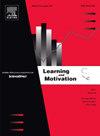Impact of digital feedback, self-efficacy, and autonomy on motivation and general english performance in online courses
IF 1.7
4区 心理学
Q3 PSYCHOLOGY, BIOLOGICAL
引用次数: 0
Abstract
This research aimed at exploring the impact of digital feedback, self-efficacy, and autonomy on the motivation and general English performance of Chinese EFL learners in online courses. The study recruited a total of 225 participants, comprising 112 males and 113 females, purposefully selected and distributed among nine distinct groups: personalized feedback group (PFG, n = 25), generic feedback group (GFG, n = 25), no feedback group (NFG, n = 25), high self-efficacy group (HSG, n = 25), medium self-efficacy group (MSG, n = 25), low self-efficacy group (LSG, n = 25), high autonomy group (HAG, n = 25), medium autonomy group (MAG), and low autonomy group (LAG, n = 25). All groups completed a validated motivation questionnaire and a general English performance test to establish their baseline levels before the intervention. Subsequently, each group underwent specific treatments throughout the study, followed by posttests measuring changes in motivation and English performance. The results of MANOVA indicated that the PFG significantly outperformed both the GFG and NFG as to motivation and general English performance. Similarly, the HAG achieved better outcomes than the MAG and LAG across both measures, while the HSG exceeded the MSG and LSG, demonstrating the most substantial mean differences in motivation and performance. The study highlights the critical role of personalized digital feedback, heightened self-efficacy, and increased autonomy in fostering motivation and enhancing English proficiency within virtual learning environments. Consequently, this study brings into focus that incorporating these elements into online EFL education could substantially improve EFL learners’ motivation and learning achievements.
数字反馈、自我效能和自主性对在线课程学习动机和总体英语成绩的影响
本研究旨在探讨数字反馈、自我效能感和自主性对中国在线英语学习者学习动机和整体英语表现的影响。研究总共招募了225名参与者,包括112名男性和113名女性,有目的地选择和分布在9个不同的组:个性化的反馈集团(PFG n = 25),通用反馈集团(GFG n = 25),没有反馈集团(NFG n = 25),高自我效能感组(HSG集团)n = 25)中自我效能感组(味精,n = 25),低自我效能感组(汉莎天厨n = 25),高自治组织(女巫,n = 25),介质自治组织(MAG)和低自治组织(滞后,n = 25)。所有小组都完成了一份有效的动机问卷和一项普通英语表现测试,以确定干预前的基线水平。随后,每组在整个研究过程中都接受了特定的治疗,随后进行了测试,测量动机和英语表现的变化。方差分析结果表明,在动机和一般英语表现方面,PFG显著优于GFG和NFG。同样,在两项测量中,HAG比MAG和LAG取得了更好的结果,而HSG超过MSG和LSG,显示出动机和表现上最显著的平均差异。该研究强调了在虚拟学习环境中,个性化数字反馈、提高自我效能和增强自主性在培养动机和提高英语水平方面的关键作用。因此,本研究认为,将这些因素纳入在线英语教育可以大大提高英语学习者的学习动机和学习成绩。
本文章由计算机程序翻译,如有差异,请以英文原文为准。
求助全文
约1分钟内获得全文
求助全文
来源期刊

Learning and Motivation
Multiple-
CiteScore
2.90
自引率
0.00%
发文量
53
期刊介绍:
Learning and Motivation features original experimental research devoted to the analysis of basic phenomena and mechanisms of learning, memory, and motivation. These studies, involving either animal or human subjects, examine behavioral, biological, and evolutionary influences on the learning and motivation processes, and often report on an integrated series of experiments that advance knowledge in this field. Theoretical papers and shorter reports are also considered.
 求助内容:
求助内容: 应助结果提醒方式:
应助结果提醒方式:


